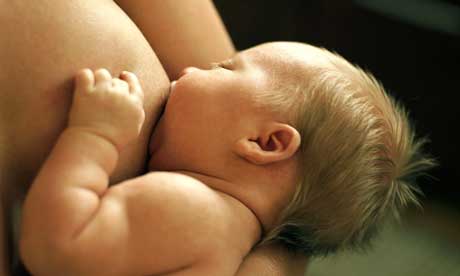
Breastfed babies are more intelligent than those weaned on formula milk, according to the most comprehensive study conducted on the issue.
Doctors followed nearly 14,000 children over six and a half years and found that those who were breastfed fared significantly better in IQ tests.
At the age of six and a half, children who had been exclusively breastfed scored 7.5 points higher in verbal intelligence tests and 5.9 points higher in overall IQ tests. Teachers also rated the breastfed children higher at reading, writing and solving mathematical problems.
The finding, which confirms earlier research, raises the question of whether it is breast milk itself or associated maternal care that is responsible for boosting the intelligence of developing babies. Previous studies have hinted that breastfeeding increases intelligence, but the effect has proved hard to nail down.
One problem is that in nearly every study so far the mothers involved have chosen beforehand whether or not they plan to breastfeed. It meant doctors could not rule out the possibility that breastfeeding women were simply brighter, or were likely to interact more with their children. In the latest study, researchers led by Michael Kramer, a professor of paediatrics at McGill University in Montreal, studied children born at 31 maternity hospitals across Belarus between 1996 and 1997. They got around the problems faced by earlier studies by randomly assigning half of the hospitals to adopt a breastfeeding promotion programme, while the rest acted as a control group and continued to offer their usual post-natal advice.
Between 2002-05 the doctors interviewed 13,889 of the children and their mothers, around half of whom had attended clinics promoting breastfeeding. Of mothers who visited clinics that advocated breastfeeding, 43% fed their babies only on breast milk until the age of three months, compared with 6.4% of women at the control clinics.
"Our study provides the strongest evidence to date that prolonged and exclusive breastfeeding makes kids smarter," said Kramer, whose research appears in the Archives of General Psychiatry.
Figures last year from the UK Infant Feeding Survey revealed 76% of women started breastfeeding their babies, but less than half continued to breastfeed their babies beyond six weeks.
The researchers' study fails to answer the question of what it is about breastfeeding that boosts intelligence. "It remains unclear whether the observed cognitive benefits of breastfeeding are due to some constituent of breast milk, or are related to the physical and social interactions inherent in breastfeeding," Kramer writes.
Breast milk is known to contain essential long-chain fatty acids and a chemical called insulin-like growth factor, which alone might be responsible for boosting intelligence.

